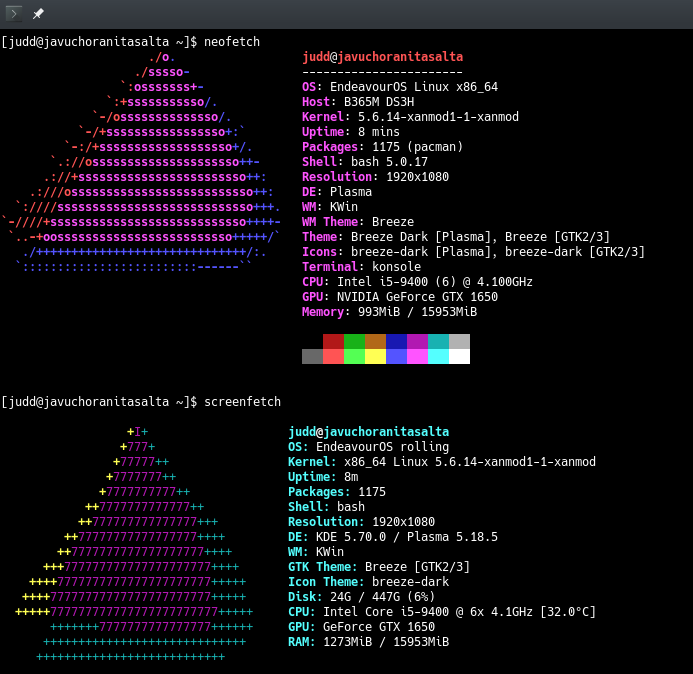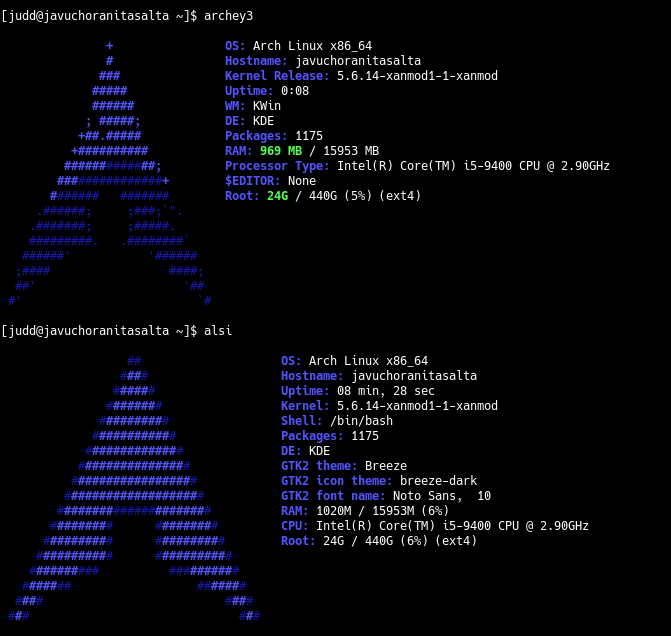Well… interesting. As usual:
Different kernels are hard to benchmark in a practical way. You could optimize a kernel to give you maximum performance in benchmarks and it might make your desktop less responsive in general use.
Also, I didn’t watch the whole video but isn’t is possible that the tomb raider benchmark is GPU bound?
It’s pointed out in the comments: It would have been better to lower the resolution and effects significantly so that what the CPU does is more noticeable.
Edit: also, at least according to their page, Xanmod just like Zen claims to have the kernel optimized for desktop use, not explicitly gaming like some custom kernels.
I always look to Phoronix for info. He does a pretty good job at testing. I think every different hardware setup is going to be slightly or significantly different. I do know that Clear Linux is supposedly the speed king. ![]() Optimised for Intel hardware of course!
Optimised for Intel hardware of course!
Apparently we are talking about sub 2% improvements. If it’s accurate I don’t think it’s worth wasting breath on this. I mean with a standard kernel you get maximum support and minimum friction. I also played around with zen for a while but in the end I just couldn’t tell, and dumped it in favor of standard kernel for improved support (computer was freezing sometimes, no idea if it was the kernel, but I just wanted to rule it out).
I use ZEN Kernel mainly due to 2 reasons:
a) everything works (like for mainline) and maybe there is some minor benefit compared to mainline
b) If I understand correct, than for my configuration (BTRFS fully encrypted and swap file) the LTS Kernel will not work. But I wanted to have 2 Kernels, one as backup. So I use ZEN and have mainline as backup.
I have been using the Zen kernel up until today, because it was more responsive on the machine I’ve got, which should be ridiculously responsive, but would often strangely lag. Then today I started getting weird lagginess again, total lockups, and things like this happening:
May 31 13:30:47 onyx-laptop kernel: irq 16: nobody cared (try booting with the "irqpoll" option)
May 31 13:30:47 onyx-laptop kernel: CPU: 3 PID: 0 Comm: swapper/3 Tainted: G OE 5.6.15-zen2-1-zen #1
May 31 13:30:47 onyx-laptop kernel: Hardware name: ASUSTeK COMPUTER INC. ROG Strix G531GT_G531GT/G531GT, BIOS G531GT.306 03/11/2020
May 31 13:30:47 onyx-laptop kernel: Call Trace:
May 31 13:30:47 onyx-laptop kernel: <IRQ>
May 31 13:30:47 onyx-laptop kernel: dump_stack+0x66/0x90
May 31 13:30:47 onyx-laptop kernel: __report_bad_irq+0x35/0xaa
May 31 13:30:47 onyx-laptop kernel: note_interrupt.cold+0xb/0x71
May 31 13:30:47 onyx-laptop kernel: handle_irq_event+0xa9/0xb0
May 31 13:30:47 onyx-laptop kernel: handle_fasteoi_irq+0xce/0x1f0
May 31 13:30:47 onyx-laptop kernel: do_IRQ+0x84/0x140
May 31 13:30:47 onyx-laptop kernel: common_interrupt+0xf/0xf
May 31 13:30:47 onyx-laptop kernel: </IRQ>
May 31 13:30:47 onyx-laptop kernel: RIP: 0010:cpuidle_enter_state+0xc9/0x840
May 31 13:30:47 onyx-laptop kernel: Code: e8 ec eb 80 ff 80 7c 24 0f 00 74 17 9c 58 0f 1f 44 00 00 f6 c4 02 0f 85 f2 05 00 00 31 ff e8 ee 77 88 ff fb 66 0f 1f 44 00 00 <45> 85 e4 0f 88 e4 01 00 00 49 63 d4 4c 2b 7c 24 10 48 8d 04 52 48
May 31 13:30:47 onyx-laptop kernel: RSP: 0018:ffffb63cc0107e68 EFLAGS: 00000246 ORIG_RAX: ffffffffffffffde
May 31 13:30:47 onyx-laptop kernel: RAX: ffff9c30ddac0000 RBX: ffff9c30ddaf7800 RCX: 000000000000001f
May 31 13:30:47 onyx-laptop kernel: RDX: 0000000000000000 RSI: 000000003161f86e RDI: 0000000000000000
May 31 13:30:47 onyx-laptop kernel: RBP: ffffffff840ca860 R08: 00000552784b428f R09: 0000000000000004
May 31 13:30:47 onyx-laptop kernel: R10: 0000000000000004 R11: 0000000000000007 R12: 0000000000000001
May 31 13:30:47 onyx-laptop kernel: R13: ffff9c30ddaf7800 R14: 0000000000000001 R15: 00000552784b428f
May 31 13:30:47 onyx-laptop kernel: ? cpuidle_enter_state+0xa4/0x840
May 31 13:30:47 onyx-laptop kernel: cpuidle_enter+0x29/0x40
May 31 13:30:47 onyx-laptop kernel: do_idle+0x1fb/0x2b0
May 31 13:30:47 onyx-laptop kernel: cpu_startup_entry+0x19/0x20
May 31 13:30:47 onyx-laptop kernel: start_secondary+0x1c6/0x220
May 31 13:30:47 onyx-laptop kernel: secondary_startup_64+0xb6/0xc0
May 31 13:30:47 onyx-laptop kernel: handlers:
May 31 13:30:47 onyx-laptop kernel: [<000000006cf0d056>] ahci_single_level_irq_intr
May 31 13:30:47 onyx-laptop kernel: [<0000000050dd405a>] nvme_irq
May 31 13:30:47 onyx-laptop kernel: [<0000000050dd405a>] nvme_irq
May 31 13:30:47 onyx-laptop kernel: [<00000000fb854df7>] usb_hcd_irq
May 31 13:30:47 onyx-laptop kernel: [<0000000090569ee9>] i801_isr [i2c_i801]
May 31 13:30:47 onyx-laptop kernel: [<0000000061a8b43d>] idma64_irq [idma64]
May 31 13:30:47 onyx-laptop kernel: [<0000000077aae4c4>] mei_me_irq_quick_handler [mei_me] threaded [<0000000028598a25>] mei_me_irq_thread_handler [mei_me]
May 31 13:30:47 onyx-laptop kernel: [<000000009f25e77d>] i2c_dw_isr
May 31 13:30:47 onyx-laptop kernel: [<000000009df8f6e4>] iwl_pcie_isr [iwlwifi] threaded [<0000000027dcb74a>] iwl_pcie_irq_handler [iwlwifi]
May 31 13:30:47 onyx-laptop kernel: [<0000000066ffb617>] gen8_irq_handler [i915]
May 31 13:30:47 onyx-laptop kernel: [<000000001f0da780>] azx_interrupt [snd_hda_codec]
May 31 13:30:47 onyx-laptop kernel: Disabling IRQ #16
So I am back to mainline kernel, and it’s been fine for the past 4 hours.
EDIT: So the next day it happened again, with the mainline kernel. Sigh. Looks like a hardware issue with this new laptop. Thanks, Asus.
Trying the xanmod kernel but already can say not worth it; it is compiling, so it takes about 15 minutes to install it, it seems.
I’m installing it, for now it takes 13 minutes …
Still going. Oh well, this is why i use Gentoo (sarcasm). ![]()
Seriously tho, I will probably try Zen or CK after this, and those are pre-compiled.
Zen has been a daily use for a long time and it never gave me any problems.
CK is a pending subject …
Well, so much for trying xanmod.
I had to rush taking the dogs out, and in the meantime sudo timed out. So… compiled for 1 hour 45 minutes then never installed. Yay.
Oh well, installed zen.
Will try ck too.
Edit: SO, now have four kernels installed ![]() linux, linux-zen, linux-ck and linux-lts.
linux, linux-zen, linux-ck and linux-lts.
Basically I will dump two in a bit.
Interestingly all talk about CK seems to have died about two years ago, while people still talk about Zen. No real indication of quality of course but it is interesting that Zen still seems popular and is now compared vs lqx and xanmod.
Oh I know, b ut I meant on the internet as a whole. No youtube videos, no forum posts, nothing on reddit newer than 2018 I think…
There’s going to be some talk about it from now on when someone duckducks it ![]() this very thread. Ahh, the ways the interwebs work.
this very thread. Ahh, the ways the interwebs work.
More interesting stuff. The main maintainer for liquorix is also the main maintainer for zen. The only real difference is that liqourix uses the MuQSS task scheduler while Zen uses the normal Linux kernel’s CFS.
I am not sure why, or even if it makes a difference, but Liquorix is supposedly optimized for Debian-based systems (tho some Arch users compile it and run it on Arch; it is in the AUR but needs to be compiled just like the Xanmod kernel).
Anyone else know why he has opted for two different task schedulers despite otherwise the kernels being 99% compiled identically? IS it a Debian optimization somehow?
Oh I love searching for something and finding my own questions at the top. SO helpful ![]()
Well, I have been compiling exactly 90 minutes, but here is linux-xanmod:


